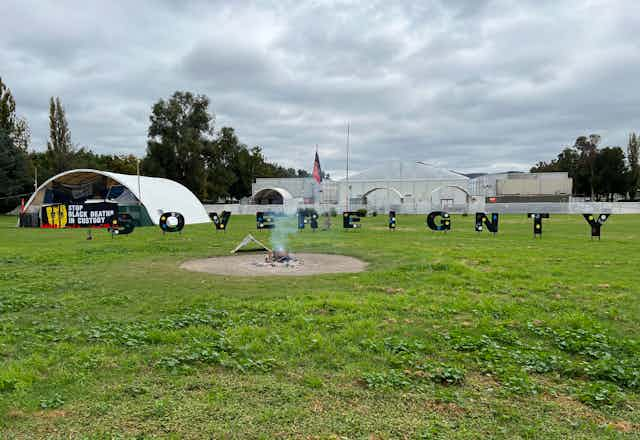Aboriginal and Torres Strait Islander readers and listeners are advised this article and podcast contain names of deceased people.
The Aboriginal Tent Embassy – a site of First Nations protest in Canberra, Australia – marks its 50th anniversary this year. In this episode of The Conversation Weekly podcast, we hear about its history and how the ongoing protest has influenced a new generation of Indigenous activism.
Plus, new research into how the COVID-19 pandemic is affecting the lives of young people born into poverty around the world – and their job prospects.
On the morning of January 26, 1972, four young Aboriginal men left Sydney for the Australian capital, Canberra. When they arrived, they sat down on the lawns outside parliament house, erected a beach umbrella and held up a sign that said “Aboriginal embassy”. They were protesting against a speech by the government, which dismissed hopes for Aboriginal land rights.
Read more: A short history of the Aboriginal Tent Embassy – an indelible reminder of unceded sovereignty
For most of the following 50 years, the Aboriginal Tent Embassy has kept up a presence on the lawn in front of what is now Old Parliament House in Canberra. It has become a symbol of an enduring fight for Indigenous sovereignty in Australia. It’s also survived attacks and controversies, most recently from a group calling themselves the “Original Sovereigns” who tried to hijack the Tent Embassy.
In this episode of The Conversation Weekly podcast, Carissa Lee, First Nations and public policy editor at The Conversation in Australia, yarns with two Indigenous researchers about the enduring place the Tent Embassy plays in the fight for Indigenous land rights and justice.
Bronwyn Carlson is a professor of Indigenous studies and director of the Centre for Global Indigenous Futures at Macquarie University in Sydney. “While the Tent Embassy is primarily a symbol of land rights, it means so much more,” she says. “It’s actually a symbol against the power that’s unlawfully in place across this continent that continues to oppress Indigenous people and deny us our rights as sovereign peoples to this place.”
Lynda-June Coe, a PhD candidate at Macquarie University, has family ties to the Tent Embassy and first visited as a child in the late 1980s. “I can remember my aunties and uncles standing up having very fiery, very robust conversations with other First Nations people around the fire,” says Coe. She says the Tent Embassy still exists today because “we refuse to go away, we refuse to die out”. Coe’s aunt, Jenny Munro, also talks to us at the Tent Embassy site in Canberra about her continued involvement in the protest site today.
This episode of The Conversation Weekly is supported by the UK/Australia Season Patrons Board, the British Council and the Australian Government as part of the UK/Australia Season, which centres on the theme Who Are We Now? The season’s programme reflects on the two countries’ shared history, explores their current relationship, and imagines their future together.
In our second story in this episode, we hear how the pandemic has changed the landscape of economic opportunity for people in their twenties. Since 2001, Young Lives, a study run by the University of Oxford in the UK, has been following the lives of two cohorts of young people born into poverty in India, Peru, Vietnam and Ethiopia.
Until the pandemic, the researchers mostly had a good news story to tell about how life was improving for the younger generations in their study. But the pandemic has set things back – in particular job opportunities for young people. Catherine Porter, director of the Young Lives study, talks us through some of their latest results – and what they reveal about the gender employment gap for young people in the wake of the pandemic. (Listen from 33m46s)
This episode of The Conversation Weekly was produced by Mend Mariwany and Gemma Ware, with sound design by Eloise Stevens. Reporting from the Aboriginal Tent Embassy in Canberra by Ellen Duffy. Our theme music is by Neeta Sarl. You can find us on Twitter @TC_Audio, on Instagram at theconversationdotcom or via email. You can also sign up to The Conversation’s free daily email here.
Newsclips in this episode from ABC News, 7News Australia and ABC Australia.
You can listen to The Conversation Weekly via any of the apps listed above, download it directly via our RSS feed, or find out how else to listen here.
Disclosure statements of the researchers interviewed in this episode:
The Aboriginal Tent Embassy is a site of cultural and political significance for Lynda-June Coe and members of her family. Some of the Aboriginal activists involved in the 1972 protest are her Elders, Aunties and Uncles.
Bronwyn Carlson does not work for, consult, own shares in or receive funding from any company or organisation that would benefit from this article, and has disclosed no relevant affiliations beyond their academic appointment.
The Young Lives study currently receives funding from UK Government (FCDO), Echidna Giving, Packard Foundation, Medical Research Council, NIH. Catherine Porter has previously received funding from ESRC, WIDER, Inter-American Development Bank, the World Bank and British Academy.

